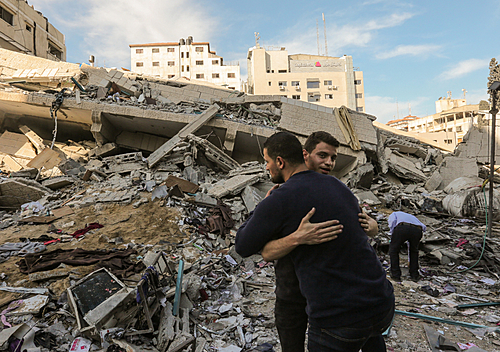
A source close to Hamas told the AFP news agency this Wednesday (29) that the Islamic group is willing to extend the ceasefire for another four days.
“Hamas informed the mediators that it is willing to extend the truce for four days and that the movement will be able to release Israeli prisoners that the group, other resistance movements and other parties are holding captive during this period, in accordance with the terms of the truce existing,” the source told AFP.
US Secretary of State Antony Blinken stated at a press conference in Brussels this Wednesday (29), that the country is doing what it can to extend the pause, “so that we continue to remove more hostages and receive more humanitarian assistance.”
“We will continue our efforts to prevent the conflict from spreading and remain focused on enabling the safe exit of American citizens and other foreign nationals from Gaza,” Blinken said.
An initial agreement established a four-day pause in fighting in the Gaza Strip and was extended for another two days, until this Wednesday (29), according to an announcement made by Qatari authorities on Monday (28). This Tuesday, the fifth day of the truce, 12 Israeli hostages and 30 Palestinian prisoners were released. In total, 63 Israeli hostages and 180 Palestinian prisoners had been released by Tuesday.
CIA and Mossad participate in the discussion
The heads of the US and Israeli intelligence agencies, CIA and Mossad, arrived in Doha on Tuesday (28) to speak with Qatari authorities with the aim of extending the truce agreement in the conflict between Israel and Hamas. CIA Director William J. Burns, the head of the Israeli intelligence service Mossad, David Barnea, and Qatari Prime Minister Mohammed Bin Abdulrahman al-Thani met with Egyptian officials to discuss extending the agreement.
According to information from The Washington Post, Burns is pushing for Hamas and Israel to increase the focus of their hostage negotiations, which have so far been limited to women and children, to also cover the release of men and military personnel. He is also seeking a longer pause of several days of fighting, while also taking into account the Israeli demand that Hamas release at least 10 people for each day that there is a lull in the war.
Context
The core of the Arab-Israeli issue is the way in which the State of Israel was created in 1948, with numerous unresolved points, such as the expected creation of an Arab State in the Palestine region, the confiscation of land and the expulsion of Palestinians who became refugees in neighboring countries.
The decision to create the two states was taken within the scope of the United Nations (UN) and took place without the agreement of several Arab countries, generating even more conflicts in the region.
:: Ukraine claims to have taken control of strategic territory on the banks of the Dnipro River ::
Over the following decades, the Israeli occupation of the Palestinian territories – supported by the US – became harsher, which stimulated the creation of resistance movements. There were numerous failed attempts at peace agreements and, in the 1990s, the Treaty of Oslo was reached, in which Israel and the Palestine Liberation Organization recognized each other and provided for the end of the Israeli military occupation.
The agreement was met with opposition from sectors in Israel – who even killed the country’s then prime minister – and from Palestinian groups, such as Hamas, which began its campaign with suicide bombers. After the Israeli military exit from the occupied lands in Gaza, the first Palestinian election took place, won by Hamas (2006), but not internationally recognized. The following year, Hamas expelled moderates from the Fatah group from Gaza and dominated the region.
On October 7, 2023, Hamas launched its biggest operation yet, invading Israeli territory and causing the highest number of deaths in the country’s history, 1,400, in addition to taking around 200 hostages. The Israeli response has been brutal, with constant bombings that have already caused the death of thousands of Palestinians, in addition to cutting off water and electricity supplies, measures considered disproportionate, criticized and labeled “massacre” and “genocide” by several international organizations.
*With information from Al Jazeera, Diário de Notícias and The Washington Post
Editing: Leandro Melito
Source: www.brasildefato.com.br

